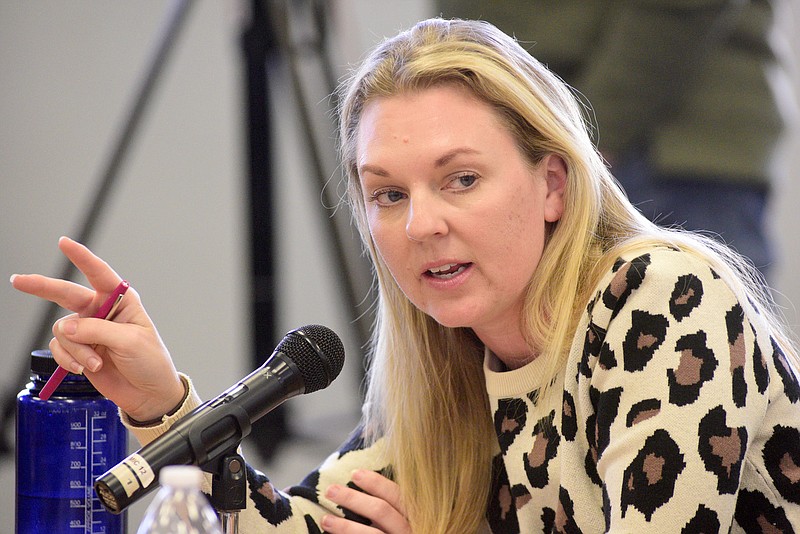The Hamilton County Republican Party declared over the weekend it was all in for partisan school board races.
Some current members of the Hamilton County Board of Education oppose legislation that offers the option of partisan races that Tennessee Gov. Bill Lee recently signed into law. Some support it, and others are ambivalent.
We said previously we were ambivalent, too, but we do believe the change from nonpartisan races will force candidates to be more honest about who they are, who is backing them, and what they believe and don't believe.
However, like school board member Rhonda Thurman, we also bemoan the fact partisan races force candidates to have to raise money for both a primary and general election and worry that it will keep good, if modestly affluent, candidates from running.
In 2022, current school board members Joe Smith (District 3), Karitsa Jones (District 5), Jenny Hill (District 6), Tucker McClendon (District 8) and James Walker (District 9) are up for re-election. Hill, also now a Chattanooga city councilwoman, has said she will not be running for re-election to her seat.
So, potentially, District 6 will be open, plus the new Districts 10 and 11, if the Hamilton County Commission approves the 11-district set-up for the school board at its regular meeting on Wednesday.
Hamilton County Democrats haven't said whether they - like Republicans - plan to run candidates with a party label.
With an eye on the future, we wondered how school board races since 2000 might have changed had there been partisan elections.
- 2020: In District 2, covering Signal Mountain and parts of Red Bank, Marco Perez - with the help of local Democrats - defeated declared Republican Tom Decosimo. Would Perez have declared himself a Democrat in order to be elected?
- 2018: In District 6, covering Lookout Valley and parts of downtown, North Chattanooga and Red Bank, Hill had the backing of Republicans and Democrats in defeating Michael Henry. Would the small businesswoman have had the same backing had she declared she was a Democrat?
- 2018: In District 8, covering East Ridge and parts of Brainerd and East Brainerd, McClendon was a young, recent University of Tennessee at Chattanooga graduate. In the slightly Republican-leaning district, would he still have won if he'd declared himself a Republican and incumbent veteran educator David Testerman said he was a Democrat?
- 2016: In District 2, if winner Kathy Lennon had declared herself a Democrat and incumbent Jonathan Welch a Republican, assuming those were their proclivities, it might have changed the result in a race Lennon won by only 98 votes.
- 2016: In District 4, covering parts of Alton Park, downtown and East Chattanooga, white business executive Tiffanie Robinson defeated incumbent George Ricks and three other candidates, all of whom are Black. Were there primaries, Ricks likely would have won among Democrats. But if Robinson - who won her seat with Republican backing by 54 votes - were to have declared as a Republican, she probably would not have beaten Ricks, who would have both his and some of the others candidates' votes in the majority minority district, in the general election.
- 2014: In District 8, both candidates, Testerman and Samevelyn Rock, were educators and likely would have run as Democrats. One would have lost in the primary. Would a Republican with party backing then have stepped forward to challenge Testerman?
- 2010: In District 3, covering much of Hixson, Marty Haynes and Ken Smith, both of whom have been elected to public office since with Republican help, likely would have faced off in a GOP primary. But would the then-incumbent, Everett Fairchild, have been in that same primary, or could he as a Democrat have squeezed past eventual winner Haynes?
The fact that most of the races that might have changed have occurred in the last decade or so indicates the increasing influence of partisan politics in the nonpartisan races. The candidates might have been officially nonpartisan, but in competitive districts parties got behind many of the candidates.
In the new districts, should they get Wednesday's commission go-ahead, we have speculated that 10 in the eastern part of Hamilton County will be reliably Republican and that 11 across the southern border of the county extending to Missionary Ridge, will lean Democratic. If Democrats - despite their reservations about partisan races - don't hold their own primary, several nonpartisan candidates could face, and lose to, one well-financed Republican in District 11.
For that matter, without a Democratic primary, the same thing could happen whenever there's an open district that a Democrat is vacating. Several Democrats would run for the office on a nonpartisan basis, but they would split the vote, and a well-spoken, well-financed Republican could walk into office.
Now that county Republicans have made their choice, Democrats have a lot to consider.
